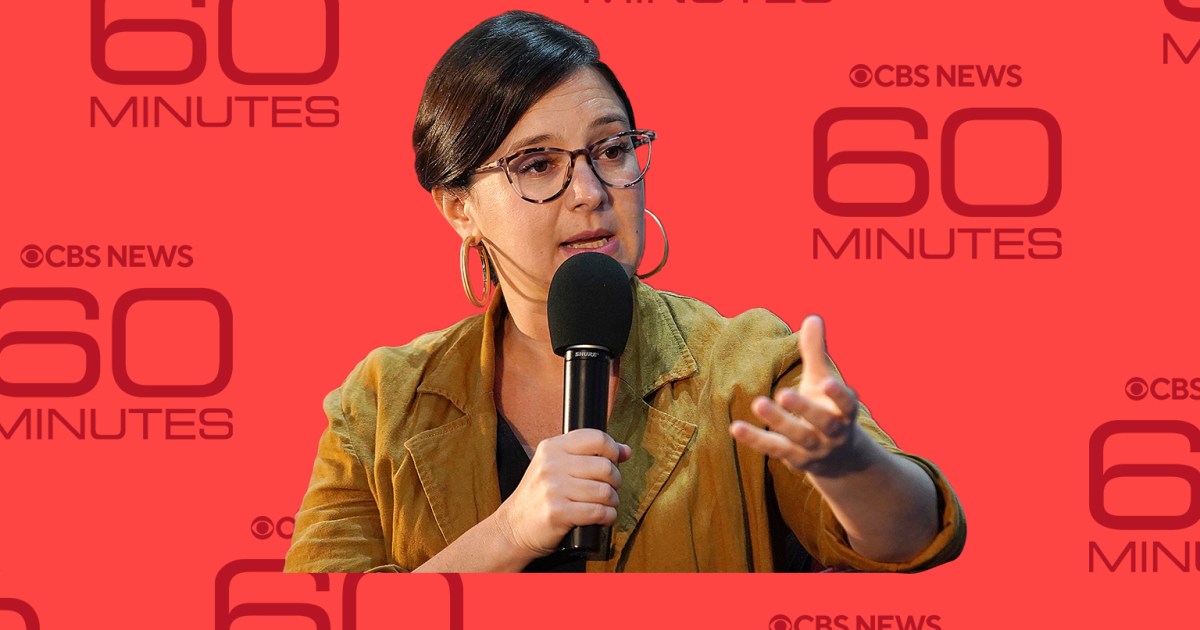A version of the below article first appeared in David Corn’s newsletter, Our Land. The newsletter comes out twice a week (most of the time) and provides behind-the-scenes stories and articles about politics, media, and culture. Subscribing costs just $5 a month—but you can sign up for a free 30-day trial.
The appointment of Bari Weiss, the former New York Times opinion writer who started the heterodox Free Press website, to lead venerable CBS News set the media world in a tizzy. Since she had no experience in television broadcast news operations, David Ellison, the CEO of Paramount Skydance, must have selected her for ideological and editorial reasons. Weiss had positioned herself as the scourge of supposedly woke and DEI-driven liberal media, presumably a stance that appealed to Ellison, the son of tech billionaire Larry Ellison, a Trump supporter who put up much of the money that financed his son’s recent takeover of Paramount.
Weiss’ first days at the network yielded worrisome signs. She asked senior staff at 60 Minutes, why does the country think you’re biased? This query suggested she buys the right-wing narrative Donald Trump propels about the media. CBS News, according to recent polling, is actually one of the most trusted news outfits, and the overall decline in popular trust in the media has been fueled over the past few decades mostly by a steep decline among Republicans—who have been the target of a concerted campaign waged by Trump and, before him, other conservative leaders (and Fox News!) to discredit the media. (A loss of trust among Democrats and independents has occurred but it’s been less pronounced.) Trump and the right’s war on the media has largely succeeded. And Weiss, whose rise to power has been a result of her crusade against the libs, seemingly accepts Trump’s terms—not a good sign.
Weiss’ inexperience, her embrace of the right-wing assault on the media, and her eagerness to boost her political opinions over her network’s reporting are all reasons to worry about her tenure at CBS News.
Nor were other recent developments at CBS News that the New York Times reported: “In the two weeks that she has worked at the network, Ms. Weiss has not promoted any articles or reporting from CBS News on her X account, which reaches 1.1 million followers…As a Middle East peace deal came into view, Ms. Weiss shared numerous pro-Israel opinion pieces from The Free Press, and an editorial that said Zohran Mamdani, the Democratic nominee for New York City mayor, had failed ‘the Hamas test.’” She seemed more interested in opinion warfare than news reporting. And according to Status, Weiss has been considering hiring Fox News host Bret Baier and bringing back to CBS News Catherine Herridge, who was laid off from the network last year and whose past work included credulously reporting hyped-up Republican charges of Democratic misdeeds.
Weiss’ inexperience, her embrace of the right-wing assault on the media, and her eagerness to boost her political opinions over her network’s reporting are all reasons to worry about her tenure at CBS News. But there’s something else: artificial intelligence.
Larry Ellison is deeply involved in the AI gold rush. He’s chairman and founder of Oracle, a critical player in the AI boom, providing cloud computing and infrastructure for many AI applications and partnering with OpenAI. (He’s predicted, with enthusiasm, that AI will give us a surveillance state in which citizens “will be on their best behavior because we are constantly recording and reporting everything that’s going on.”) And David Ellison, like most CEOs these days, is looking to AI to turbocharge his company.
There’s much to worry about regarding AI—most notably, massive job displacement and assorted doomsday scenarios about the end of humanity. But at this moment, a potential peril is at hand: the end of truth.
AI may well be the biggest story of the coming years, and a news organization owned by a corporation with huge interests in the sector and run by a person plopped into the top slot because of her views, not her broadcasting know-how, might feel pressure on this front. But what’s most concerning is indeed the issue of trust—though perhaps not in the way Weiss has approached it.
We are on the cusp of a dangerous new world. There’s much to worry about regarding AI—most notably, massive job displacement and assorted doomsday scenarios about the end of humanity. But at this moment, a potential peril is at hand: the end of truth. You might have heard that before. The introduction of Photoshop years ago was going to make all photographs—and, thus, all news images—suspect. Yet we got on.
The threat now is more profound. A few weeks ago, OpenAI introduced a new version of Sora, its application that allows users to create short videos entirely through AI. You want a video of yourself reaching the top of Mt. Everest? No problem. Initial reviewers—it’s not yet widely available, but it soon will be—have praised the easy-to-use program and the realistic-looking videos it produces. Sam Altman, OpenAI’s leader, has proclaimed Sora “the most powerful imagination engine ever built.”
But just as Sora can manufacture fanciful creations, such as a dog conducting open-heart surgery, it can yield the deepest of deep fakes: videos of prominent people making statements they never said, of natural disasters or terrorist attacks that didn’t happen, of crimes that were not committed, or military strikes that did not occur. As the New York Times reported, “In its first three days, users of a new app from OpenAI deployed artificial intelligence to create strikingly realistic videos of ballot fraud, immigration arrests, protests, crimes and attacks on city streets—none of which took place.” The possibilities are endless—and damn scary. Faked videos could intensify or trigger conflicts, undermine elections, defraud consumers, swing financial markets, and frame people.
Sora has guardrails—for now. There is a watermark noting its videos are AI-generated. You may not produce videos of living people uttering words they did not speak. The production of videos with graphic violence is not permitted. But clever folks have already found ways to evade the limitations, and other systems won’t even bother with such restraints. Very soon our social media buckets will fill with AI slop. Much of it will be irrelevant and of no import. But there will be malicious disinformation produced to inflame, defame, mislead, and frighten for political advantage, for profit, or just for kicks. How will we know what’s real?
Who or what is left to protect reality? Who’s going to vet the AI-orchestrated falsehoods to come? This is what we need the media for.
In a less imperfect world, the government might be of use in this regard and monitor and address the most malevolent and consequential AI disinformation. But liberals would not want to see the Trump administration in charge of such fact-checking, and conservatives for years have viciously assailed and beaten back counter-disinformation efforts mounted by government agencies, colleges, nonprofits, and other entities, decrying them as Big Brother censorship aimed at silencing right-wingers. I understand their concern, for Trump has essentially turned MAGA into one big disinformation operation. It’s no wonder his allies attack endeavors to confront such propaganda.
Who or what is left to protect reality? Who’s going to vet the AI-orchestrated falsehoods to come? This is what we need the media for. Major news organizations will have to assume the task of quickly scrutinizing disinformation and misinformation, telling us whether the video of a tsunami heading toward the West Coast or another of thugs beating up a senator or one of explosions in downtown Chicago are legitimate. When a video appears of a political candidate confessing to a heinous crime or telling a racist joke, we will need to look to a source to determine whether that occurred. This should be the job of major news operations.
Of course, the big media outlets—the New York Times, CNN, broadcast news—tend to be for-profit enterprises. Who knows if becoming all-important arbiters of reality will fit their business models? But most important will be if their vetting is trusted. These institutions will have to be believed by large segments of the population—though there will always be people who will be unpersuadable.
As the AI Matrix approaches, we are going to need large institutions with influence and reach to help us prevent the truth from being wiped out by a flood of lies. And we will need somewhere to turn for guidance.
Thus, we return to Bari Weiss. She accurately points out that the news media has fallen on the trust scale. But she appears to have fallen for the false right-wing explanation: They’re too damn liberal. Though it’s early in her tenure at CBS News, her ideologically fueled appointment does not inspire confidence that Ellison (or the Ellisons) intend to direct CBS News in the direction where it could function as one of the essential vetters in this new and chaotic information ecosystem.
Like many in the non-mainstream media, I have long been critical of various aspects and actions of major news outlets, while recognizing they often produce wonderful and consequential works of journalism. Yet as the AI Matrix approaches, my hunch is that we are going to need large institutions with influence and reach (no matter if their audiences are smaller than they once were) to help us prevent the truth from being wiped out by a flood of lies. As consumers of information, we will have to learn not to accept the first impressions caused by AI disinformation and wait for confirmation—an exercise humans are not well designed for. (In the jungle eons ago, Homo sapiens could not afford to take their time to evaluate a possible threat. That could endanger them. Immediate absorption of information and snap judgments were essential for survival.) And we will need somewhere to turn for guidance.
CBS News is positioned to provide what might become the most valuable service of the news industry. Yet Weiss is not the obvious choice to guide it toward this mission. Perhaps she will surprise us. I’m rooting for what used to be called the Tiffany Network. But if we’re all left alone on the sea of AI slop, our democracy will drown.














